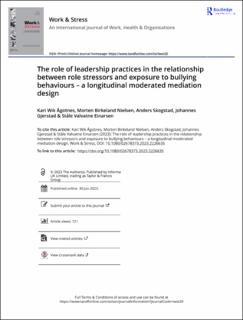The role of leadership practices in the relationship between role stressors and exposure to bullying behaviours – a longitudinal moderated mediation design
Ågotnes, Kari Wik; Nielsen, Morten Birkeland; Skogstad, Anders; Gjerstad, Johannes; Einarsen, Ståle Valvatne
Journal article, Peer reviewed
Published version

Åpne
Permanent lenke
https://hdl.handle.net/11250/3083955Utgivelsesdato
2023Metadata
Vis full innførselSamlinger
Sammendrag
Role conflicts and role ambiguity have been identified as important risk factors for exposure to workplace bullying, particularly when combined with inadequate leadership practices. Even though role ambiguity theoretically can be considered a causal precursor to role conflicts, previous research has mainly examined these role stressors as concurrent predictors of workplace bullying. The present study provides a more nuanced analysis by investigating role conflicts as a mediator in the relationship between role ambiguity and exposure to bullying behaviours. Adding to the understanding of the bullying process we also considered the possible moderating roles of laissez-faire and transformational leadership in the role stressor–bullying relationship. Employing a national probability sample of 1,164 Norwegian workers, with three measurements across a 12-month period, the results showed an indirect effect of employees’ role ambiguity on subsequent exposure to bullying behaviours through employees’ experience of role conflicts. Moreover, laissez-faire leadership exacerbated, while transformational leadership attenuated, the indirect relationship between role ambiguity and exposure to bullying behaviours through role conflicts. In summary, the present data shows that when the management of organisations neglects its inherent responsibility to adequately address employees’ experiences of role ambiguity and role conflicts, the risk of exposure to workplace bullying is likely to increase.
